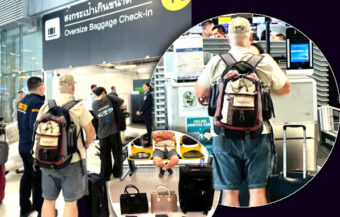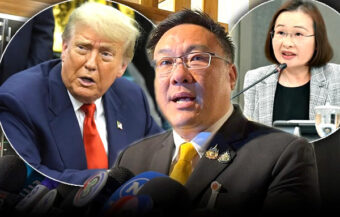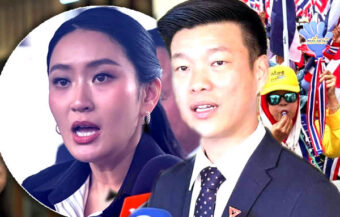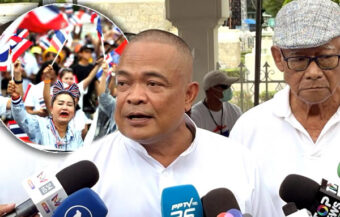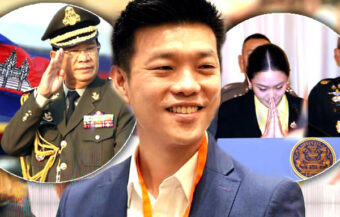The legal provision approved last week has sparked protests from the media and has damaged further Thailand’s reputation abroad, where the provisions are seen as a crude attempt to stifle critics of the government’s handling of the virus crisis. The police, however, over the weekend, attempted to reassure the public that the measure is not targeted at the press or truthful reporting by explaining how online reports on social media can induce paranoia which undermines public health control measures.
Amid a challenge to the government over its order last week under the Emergency Decree to control online commentary which spreads fear or ‘fake news’ the police have announced the arrest of a state official who admits that he spread the reports last week of an army coup against the government of Prayut Chan ocha. The news was confirmed by a senior police spokesman, who on Friday, assured journalists in the media that they were free to write critically about the government whatever the consequences provided the reports did not have malicious intent and were truthful.
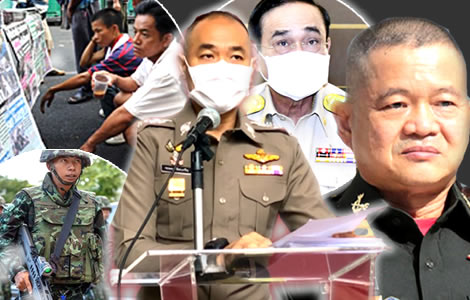
Amid uproar among media organisations over the government’s move last week to restrict public pronouncements during the emergency, on Sunday, Deputy Royal Thai Police spokesman Police Colonel Kritsana Pattanacharoen announced the arrest of a state official for spreading reports online over the weekend of an army coup.
Colonel Kritsana said the individual concerned was detained for questioning by the police in Chachoengsao province. He said the man had already admitted spreading the false reports online.
Official told police he got the news from someone he trusted and wanted to quickly publicise the news
The official told police that he published the news online having received a report from someone he knew and trusted. He told investigating officers that he thought he was doing a public service by quickly spreading the news online to the public.
The arrest followed a complaint lodged by the army with the Cyber Crime Investigation Bureau (CCIB) on the orders of the army chief, General Narongphan Jitkaewtae.
Police spokesman assures journalists they have nothing to fear provided the reporting is truthful
Colonel Kritsana, the police spokesman, on Friday, assured the media that journalists reporting critically on the government have nothing to fear provided what they report is not published with malicious intent and represents truthful reporting.
‘If you share real information, but that information causes chaos to society, that’s absolutely fine,’ Deputy Royal Thai Police spokesman Colonel Kritsana Pattanacharoen said.
Army top brass condemns dangerous speculation
Amid the controversy over the news media regulation, also on Friday, a spokesman for the Ministry of Defence, Lieutenant General Koncheep Tantravanich came out to condemn dangerous speculation and misinformation being posted online of a military coup which social media posters said had already taken place.
He pointed out that Thailand was already in a state of war with the COVID-19 virus, a contagious disease which can spread to anyone. He said such online reports further destabilised the situation.
Digital Economy and Society Minister says dangerous reports which spread fear must be countered swiftly
He was joined by a statement from the Digital Economy and Society Ministry which provided further details of the fake news report suggesting that Prime Minister Prayut Chan ocha had been held by coup actors.
The ministry said such reports stoked fear, spread paranoia and made the ability of the public to cooperate with each other and government officials more difficult.
Regulation a setback to Thailand’s reputation abroad
The move by the government to control public commentary during the crisis is seen as a setback for Thailand’s reputation abroad.
The government, on Thursday, enacted a revised provision under the Emergency Decree to take action against online commentators including the media who publish information that is deemed to create fear or panic which might undermine its efforts to counteract an increasingly dangerous situation with rising infections and deaths caused by the COVID-19 virus.
Order published in the Royal Gazette on Thursday under the Emergency Decree has drawn a strong response from Thai media organisations
The measure came into effect when it was published on Thursday in the Royal Gazette having been signed earlier by Thai Prime Minister Prayut Chan ocha.
The terms of the revised provision were published on July 10th and had already drawn strong representations from the main media organisations in Thailand to have the provision revoked or rescinded.
The regulation, under Section 9 of the Emergency Decree, replaces an earlier version which required officials to issue warnings to the offending entity or person before later instituting legal action against them where necessary.
The new regulation empowers government officials to directly order measures taken against online entities including individuals or organisations who disseminate information or news that may cause ‘public fear’.
Human rights activist slates the new provision as a ‘serious blow’ to press freedom rights in Thailand, says the move is to counter growing criticism
A senior researcher for Human Rights Asia, who monitors Thailand, slated the latest move by the government as a ‘serious blow’ to press freedom and its own efforts to portray Thailand as a country that supports greater human rights.
He clearly linked the move by the government to difficulties over its management of the COVID-19 crisis and reporting by the press in Thailand which has exposed the situation.
He said the provision was ill-defined and showed little respect for truthful and accurate news reporting.
‘I think the government realises it is now facing a credibility crisis because of this disastrous response to the Covid situation, but instead of trying to find better solutions, more efficient solutions, it chooses to gag anyone from speaking about its failures,’ Sunai Phasuk said. ‘This provision doesn’t care about accuracy or whether it is true or false.’
6 media organisations submit a letter to the Prime Minister expressing disappointment and concern
On Friday, representatives of 6 media organisations submitted a letter to the Prime Minister following the ratification of his order on Thursday.
This appeared to put into effect a proposed regulation on media output that earlier had drawn a strong representation by them which had been reportedly forwarded to the government’s top legal official, Deputy Prime Minister Wissanu Krea-ngam.
However, no response was received back.
New regulation allows for rapid action to suspend internet access of offending parties and follow up
The provision, published in the Royal Gazette, appears to place a responsibility on the National Telecommunications Commission as well as the Office of the Broadcasting Commission to intervene and order the suspension of services to violating parties.
They are also required to assist in a report to be sent to the Royal Thai Police for further legal action including prosecution under a range of laws including the Emergency Decree itself and the Computer Crime Act where a report is made in respect of online or other published contents.
Letter handed to government spokesman promised further social and legal action if law is not reversed
The representations on Friday were made by the News Broadcasting Council of Thailand, the National Press Council of Thailand, the Society for Online News Providers, the Thai Journalists Association, the Thai Broadcast Journalists Association and the National Union of Journalists with a delegation handing a letter into government spokesman Anucha Burapachaisri.
The letter, addressed to Prime Minister Prayut Chan ocha, promised both legal and social action would be taken in respect of the new regulations which have now received international attention across the world in leading media outlets.
The letter submitted makes it clear that in the absence of a substantial response to the submission and earlier representations, further action will be taken.
The media group wants to see the government withdraw its two announcements made under the Emergency Decree on Thursday (Announcement 29) the 29th of July and the previous one on July 10th last (Announcement 27).
Media may have valid legal grounds although the strength of the government’s arguments may hinge on the circumstances of the current emergency
The media may have valid legal grounds under the constitution although the case may centre on the right of the government, at this time, to acquire for itself effective emergency provisions and powers to deal with the particular circumstances of the pandemic.
In October last year, suspension orders were issued against several Thai media outlets including The Standard, Voice TV, Prachatai and Free Youth Online after an earlier order was sought by the Digital Economy and Society Ministry and then minister Buddhipongse Punnakanta.
After the order to lift the suspension was made by the Chief Justice of the Criminal Court in a 6-hour judgment, days later, Mr Winyat Chartmontria, a legal representative for Voice TV declared the ruling a significant one.
‘The Court also said, specifically to the media, that the freedom of the media is very important because it is a principle under the constitution and human rights.’
Former minister jailed by court months later
Ironically, three months later, in February 2021, the Digital Economy and Society Minister, Buddhipongse Punnakanta, was jailed along with other cabinet ministers for their part in stirring up protests against the democratically elected government of Yingluck Shinawatra in May 2013 which later led to a military coup the year after.
The case is currently under appeal.
The successor at the cabinet table to Buddhipongse Punnakanta, Chansin Treenuchagron insisted, however, this week, that the measures introduced target fake news published on online platforms.
He defended the new regulations saying that previous procedures took too long to have online outlets or platforms closed down if found to be spreading dangerous information.
He specifically cited information that may be true but which is presented out of context or without the circumstances being properly explained as an example of what is prohibited under the new order.
He said this warrants the authority which the government had given itself to act fast and decisively in such situations.
Order published by the government specifically refers to ‘newspapers and other media’ with broad effect
While presented in some quarters as a measure to combat fake news despite the government’s own Fake News Service initiative launched by the Digital Economy and Society Ministry at the end of 2019, the new order specifically mentions newspapers and traditional media which may lead to legal action before the courts.
Fake news centre ready as rights activists push for the toning down of the Computer Crime Act
The terms of the order prohibit: ‘Presenting or disseminating news via newspapers or other media with messages that may cause panic among the public or has the intention to distort information that causes misunderstandings in emergency situations that affect the security of the state, peace and order, or decent public morals
Police have orders to tighten up enforcement of all Emergency Decree regulations as part of efforts to curb the spread of COVID-19 more effectively
On Friday, when making his comments and giving assurances to the press, Colonel Kritsana also confirmed that police would pursue distorted or false images or content under the new, stronger terms of the Emergency Decree which also include a plethora of other measures designed to bring about stricter enforcement of government rules deemed necessary to make public health lockdowns more effective.
Police, on Monday, have already indicated that action will be taken against protesters who took to the streets of Bangkok, Korat and other centres in Thailand calling for the removal of the government and other reforms on Sunday.
The National Police Commissioner, General Suwat Jangyodsuk, said last week breaches of the decree would be pursued in order to keep order at this time and help minimise the spread of the COVID-19 virus.
The tighter control of online information is seen by the police as part of this operation.
Celebrities fined for criticising the government
The latest crackdown followed criticism of the police for earlier moves against several celebrities who were subject to fines for criticising the government after being summoned.
On the 27th July, Vinyat Chatmontri, a human rights lawyer and Secretary-general of the Federation of Lawyers for Rights and Freedoms took issue with comments by a senior police officer and pointed out that the government cannot be considered a juristic person under Thai law and cannot be a victim under the civil or the criminal code.
The top lawyer said that there was overwhelming case law in Thailand to support his position.
Police spokesman explains the context and origin of fake and misleading news reports which cause panic
Referring to photos appearing on social media last week of drunk people purporting to be people who had died of COVID-19, Colonel Kritsana warned that people can easily be fooled into disseminating false and misleading information which damages efforts to deal with the pandemic particularly by discouraging frontline health workers or government officials
‘You may become involved with the distribution of distorted information which creates chaos and discourages people who are working,’ the senior officer explained.
Thai reporters defend the freedom of the press and say it is essential for informing the public and maintaining confidence at this time
Leading Thai reporters have lambasted the government’s approach and were clear about the thought process behind the latest moves.
Suthicai Yoon, a highly respected journalist wrote a piece in the Bangkok Post in which he suggested that the government’s lacklustre efforts to tackle the COVID-19 emergency and its failure to order vaccines which have left it exposed, was behind the moves to stifle public criticism and dissent.
‘The mainstream media has to start asking questions about whether the government can handle the Covid-19 situation and if there will be a change of government. Calls are getting louder and they are also from government supporters,’ he opined in a devastating critique of the government in which he argued that a professional, well-conducted press was a bulwark against fake news and essential to keeping the public informed which in turn helps to bring about confidence.
Mr Suthicai certainly was, clearly, of the opinion that the bureaucratic nature of the Thai government and its response is part of the problem.
He called for a dependable and respected research institute to curate accurate information on COVID-19 but expressed his confidence that professional media practitioners can only help to get the public through what is a challenging time.
Join the Thai News forum, follow Thai Examiner on Facebook here
Receive all our stories as they come out on Telegram here
Follow Thai Examiner here
Further reading:
Army chief denies and rejects rumours of a likely coup as the country faces crisis on key fronts
Shock resignation of Minister of Finance a sign of more politics being demanded in government
Thailand stuck in a ‘vicious cycle’ which will lead to further military coups says leading academic
New ministers take the reins in a formal audience with King Rama X & Queen Suthida at Dusit Palace
Warning signs in new banking and employment reports as virus crisis hits Thailand’s bottom line hard
June export figures show a 23% decline on last year but the economy will recover by end of 2021
Prime Minister indicates that the cabinet reshuffle will be complete very shortly with no problem
Somkid ready to bow out of government as September cabinet reshuffle seems to be on the cards
Election of Prawit as Palang Pracharat leader will see more grassroots politics in government


